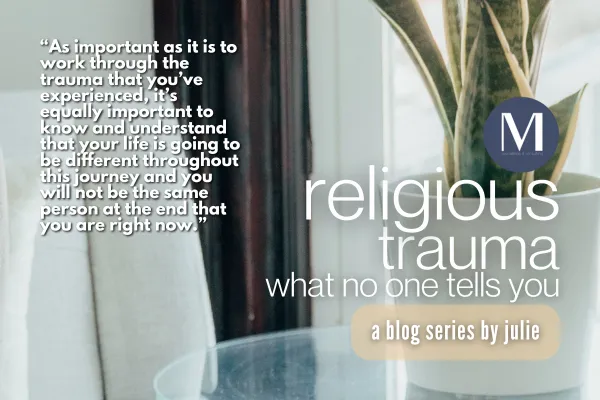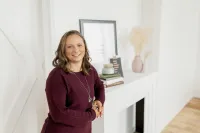the blog
A place for our team to share about topics they are passionate about, in hopes of allowing you to see and understand a bit more behind the faces on these pages.

Religious Trauma: What No One Tells You
One of the things that people don’t tell you when you start to recognize that you’ve experienced religious trauma, is that if, or when, you start to unpack it you’re going to lose some really important things. These may be certain people, rituals, habits, community, parts of your life and pieces of your heart that have been so important to you.
As important as it is to work through the trauma that you’ve experienced, it’s equally important to know and understand that your life is going to be different throughout this journey and you will not be the same person at the end that you are right now. It can be a very lonely journey to embark on as you don’t know who will be there with you throughout it and at the end of it.
When you start to unpack the beliefs and experiences that you’ve had, you start to look at things differently. You start to see the faith based community differently, maybe the leaders are different if they’ve been part of that trauma. Maybe even the spiritual figure that you’ve worshipped is going to change or your viewpoint will be impacted. You may choose to step away from the faith community entirely, or you may choose to stay within the faith community. That choice is entirely yours to make, no one can make that choice for you.
There is a natural separation that happens in relationships with proximity. The closer we are and the more we see each other the more likely we are to engage in relationship with each other. The further away we are, or the less we see each other the less likely we are to engage in relationship with each other. As you start to unpack your religious trauma you may notice that some friends, family members, mentors, or coaches don’t connect with you the same way or as often. You’re in a different space than they are, and often they can’t understand what you’re experiencing. This creates a natural drift in the relationship, which can be incredibly painful and lonely as you’re losing the relationships that have been some of the closest people to you for probably a long time. You may not lose these relationships completely, you may just find that they shift and that you’re not as close because you don’t have the same common ground that you once did. You unpacking your religious trauma can cause a lot of tension in your relationships, and you may have to put boundaries in place. This is to ensure that you feel emotionally and spiritually safe in the relationship without feeling like you have to defend yourself or like you’re being pulled back into a community that you need to step away from for a while, or for forever.
When you step away from a faith community you often become aware of how much time that community took up in your week. You may have a lot of open space in your weekly calendar that now you’re not sure what to do with. I would strongly encourage you to write a list of things that you’ve wanted to try and start to try some of those things in your more open calendar. This time can also be really helpful in giving you real space to journal and start to have conversations and reflect on what’s happened in your life and the impact of it. It’s going to be important to start to build community and relationships in other areas of your life, so you’re not just left adrift on your own.
There can be so much grief connected to all of these losses, it’s important to give yourself lots of space and time to work through the impact of your experiences. Don’t put a timeline on yourself for when you should have this stuff figured out or worked out. Grief doesn’t work that way, and when you’ve grown up or experienced religious trauma, the grief connected to that often goes to the deepest layers of our core. That grief deserves space and time, gentleness and love as it’s unpacked.
If any of this resonates with you, we would strongly encourage you to connect with a therapist if you’re not already. A therapist can be a great person to help you unpack things and piece things together as to what has happened, and the impact of it. If you’re not connected to a therapist please reach out, we would be happy to plug you into someone on our team. If you’d rather see someone outside of our MCC team still reach out and we can try to connect you to someone who would be a good fit.
Office Location: 1200 Brock Street South, Whitby, ON. L1N 4L9
© Marquis Counselling & Consulting | ALL RIGHTS RESERVED | TERMS & CONDITIONS | PRIVACY POLICY

